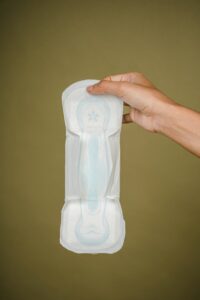MENSTRUAL HYGIENE
In the intricate tapestry of reproductive well-being, menstrual hygiene emerges as a linchpin, influencing not only personal comfort but also serving as a crucial deterrent against reproductive tract infections (RTIs). As we delve into this vital subject, we navigate the terrain of proper hygiene practices, access to sanitary products, and the transformative power of health education. Understanding and advocating for menstrual hygiene not only enhances individual health but also contributes to the broader narrative of women’s empowerment and informed well-being.

The pervasive lack of access to sanitary napkins underscores a multifaceted challenge in menstrual hygiene management. Women facing this barrier often contend not only with the absence of essential menstrual products but also with inadequate facilities for proper hygiene management. The dearth of clean toilets equipped with running water and disposable facilities exacerbates the struggle, compromising hygiene during menstruation. Furthermore, the overarching issue extends beyond physical resources to a critical gap in awareness, as many individuals may lack essential knowledge about menstrual cycles and hygiene practices. Addressing these interconnected elements is pivotal in fostering a comprehensive approach to menstrual well-being, ensuring that women can navigate their menstrual experiences with dignity and health intact.
The significance of women’s hygiene practices during menstruation cannot be overstated, given their profound health implications, particularly in terms of heightened vulnerability to reproductive tract infections (RTIs). In the present scenario, millions of women grapple with RTIs and their potential complications, with the added concern of transmission to the offspring of pregnant mothers. A pivotal factor in averting these health risks lies in enhancing women’s knowledge about menstrual hygiene and fostering safe practices. Women armed with comprehensive understanding and awareness from an early age exhibit a decreased susceptibility to RTIs and their far-reaching consequences. Therefore, instilling knowledge about menstruation from childhood onward not only promotes safe practices but also holds the potential to alleviate the suffering endured by countless women, marking a crucial stride toward reproductive health and well-being.

Before ushering in any transformative changes in menstrual practices, it is imperative to prioritize comprehensive education for girls on the intricacies of menstruation. This education should encompass not only the physiological implications but also emphasize the significance of menstruation in the context of the development of secondary sexual characteristics. Crucially, imparting knowledge about proper hygienic practices and the informed selection of disposable sanitary menstrual absorbents becomes a linchpin in fostering a healthy approach. Achieving this requires a multifaceted approach, including educational television programs, the involvement of school nurses or health personnel, integrating compulsory sex education into school curricula, and fostering open dialogue within families. By arming girls with this knowledge, we not only dispel age-old misconceptions but also empower them to engage in open discussions about menstrual matters, fostering a culture of cleanliness and comfort without hesitation. Importantly, extending this education to mothers, regardless of their educational background, is crucial in breaking inhibitions and ensuring informed conversations well before the onset of menarche.
The lack of privacy emerges as a significant challenge, particularly in resource-poor contexts where women grapple with insufficient access to fundamental facilities like water, bathrooms, and personal space. In such circumstances, the ability to maintain a standard of hygiene during menstruation is profoundly compromised. Addressing this issue necessitates an improvement in housing conditions, ensuring that basic facilities are accessible. Furthermore, advocating for the universal use of sanitary pads becomes paramount, requiring their availability at affordable prices to ensure widespread accessibility. Only by addressing these structural shortcomings and promoting affordable menstrual hygiene products can we empower women in resource-poor settings to manage their menstrual health with dignity and comfort.
In conclusion, elevating menstrual hygiene standards necessitates a nuanced understanding of the beliefs, conceptions, and sources of information within our study population. By actively engaging in spreading awareness, we not only bridge gaps in knowledge but also dismantle age-old taboos surrounding menstruation. Empowering individuals with accurate information about menstrual health fosters a culture of openness and acceptance. It is through this collective awareness that we can challenge misconceptions, promote proper hygiene practices, and pave the way for a future where menstruation is embraced with dignity and without stigma. Together, let us champion a movement where knowledge is the catalyst for transformative change, ensuring that every woman has the tools to navigate her menstrual journey with confidence and well-informed choices.
